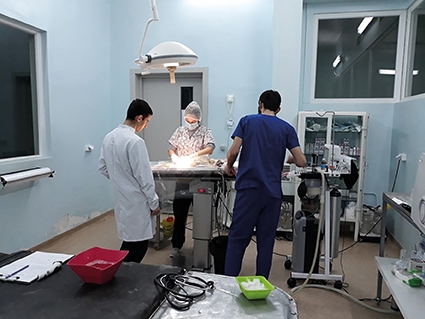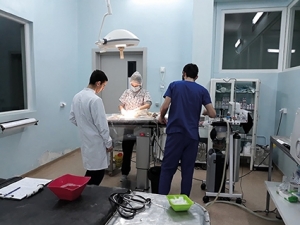World Spay Day – What it Means for Georgia & its Street Animals
Interview by Tom Day
World Spay Day is an annual incentive which draws attention to neutering stray animals in an effort to prevent them being put down. Held on the last Tuesday of every February, it has had proven results since it was set up in 1995 in the USA.
Dog Organization Georgia (DOG), The Mayhew, New Vet and Tbilisi’s Agricultural University Veterinary Clinic were all on the front line this week. GEORGIA TODAY met with Veterinary Surgeon from the Mayhew charity and New Clinic, Ana Metskhvarishvili, on the day, to discuss her thoughts about the stray dog situation in Georgia, the work she and the organization have done and what they hope to achieve in the future.
Please start by telling ase me about the work you’ve been doing and how DOG has been assisting?
Just a little background on DOG - It's a registered Georgian charity with a small shelter located in the Lisi Lake area. It gives people great opportunities to volunteer. There are many lovely dogs waiting to be taken for a walk in a very beautiful and peaceful setting. It is run by two volunteers who are doing an amazing job and are dedicating a lot of time and energy to the welfare of dogs all over Georgia. They also educate the local community on the importance of dog neutering and vaccinations.
We are working on the TVNR program (Trap, Vaccinate, Neuter, Release), run by the DOG organization and funded by The Mayhew (a UK registered animal welfare charity). They not only co-sponsor the incentive, but also train vets in Georgia for free, and advises Tbilisi City Council on dog population management. Georgian vets also have the opportunity to be trained at their London based Community Veterinary Clinic.
We all work on stray dog population management and vaccination. Our main goal through this program is to do as much neutering as possible to reduce the number of stray dogs, and to do it in a humane and sustainable way. We make sure each animal is healthy enough to undergo surgery and, if so, that surgery is carried out using internationally recognized guidelines, covering anesthesia, pain management, and proper conditions of sterility.
Why is it important to neuter dogs in Georgia?
Population control is great way to prevent such high numbers of animals on the street, living in poor conditions, falling victim to different diseases, or suffering from human violence.
The actual population of stray or free-roaming dogs in Georgia is unknown, but there are many dogs visible on the streets.
Stray population control is also very important from a disease control point of view. A lower population means fewer animals can transmit diseases such as rabies. All of the animals that have been part of our program are all vaccinated against this and other standard canine infectious diseases. With dedicated work from all sides (wild life, agricultural animals etc.), we are working towards eradicating it.
What surrounding incentives, laws, etc. are working well in Georgia?
There are a few organizations that are working for animal welfare which are mostly active through social media. Facebook has a few groups for animal lovers where people promote different events, share their love and interest in animals and even try to help each other with different situations. Local legislation on dog ownership and identification also that states that all animals must be identified.
…And what needs to be improved do you think?
The laws regarding animal protection, as we still have a lot of cases of cruelty that we hear on a daily basis. There are some laws for the protection of animal rights which are not taken seriously enough, as we keep hearing about this kind of problem.
I also think there should be more campaigns educating people on the importance of neutering, vaccination and general animal wellbeing.
How successful has the neutering promotion been this week?
It has been great, especially with the assistance of DOG. We neutered 14 dogs in total, together with the University clinic today. I am hoping that it will become more and more successful each year. Last year, The Mayhew funded a program with DOG, which involved neutering and vaccinating 374 dogs, with the additional help of New Vet Clinic, which doubled the numbers from the previous year. I myself have a bigger picture in mind for next year already.
What, in 5 years’ time, would you like to help to achieve?
I really hope that in 5 years' time, neutering will have become the norm; not just in Tbilisi, but across the whole country. The standard of neutering, I hope, will be as per international guidelines. I also hope that we will manage to spread knowledge and experience of international guidelines all over Georgia. Unfortunately, I don't think 5 years is enough to manage this problem fully, but each day counts.
I am hoping that more and more people will start to see the importance of this, and that we will have an increasing number of young people wanting to study it. The attitude of Georgian people to veterinary medicine is not exactly at its best today, and we hope to change that in the future.












